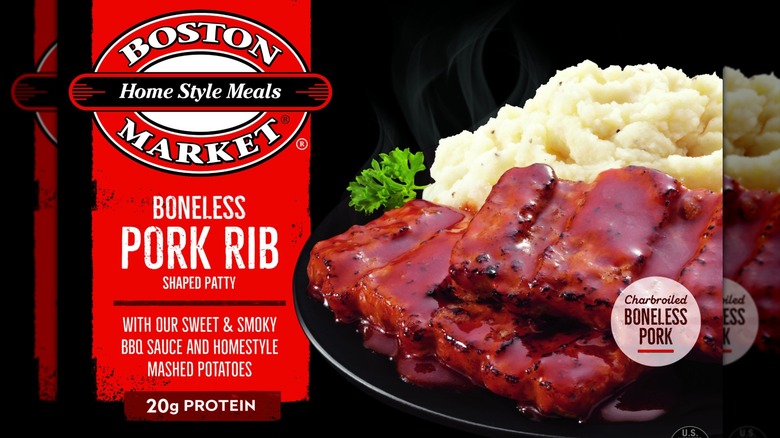The Biggest Pork Recalls In The US
Pork is, without a doubt, one of the most popular meat choices in the United States. In fact, research suggests that it is actually America's third favorite type of meat, after chicken and beef. It's no surprise, really. It features in the country's favorite pizza topping (pepperoni, of course), one of its favorite sandwich fillings (ham), and one of its most beloved breakfast foods (sausage). But, as with many different types of meat, pork comes with some serious downsides. No, we're not talking about chronic disease risk (although pork does feature in many distinctly unhealthy processed meat products), but recalls.
Over the years, the Food Safety and Inspection Service (FSIS) has issued many recalls for pork products. Sometimes, it's due to fears that they are harboring harmful foodborne bacteria, like listeria, while other times, it's because they contain undeclared allergens. In some cases, bone fragments or pieces of hard plastic have led to pork recalls.
If you're concerned about the safety of your food, one of the best things to do is to keep an eye out for announcements from the FSIS. Below, we've compiled some examples of the biggest pork recalls in U.S. history.
Perdue recalled more than 2.3 million pounds of cooked pork products over listeria concerns (2021)
Unfortunately, pork can sometimes harbor dangerous foodborne bacteria, including listeria. If consumed, listeria can lead to a harmful illness called listeriosis, which is particularly dangerous for vulnerable people, including the elderly and the very young. This is why it's imperative that as soon as there are suspicions that a food product is contaminated with listeria, it is recalled from the food supply immediately. This is what happened in 2021, when FSIS testing revealed listeria was present in samples of pepperoni and ham produced by Michigan-based company Alexander & Hornung.
As a result, the Alexander & Hornung plant (which is now closed, but at the time was operated by Perdue Farms, a major U.S. meat processor) had to issue a recall for more than 2.3 million pounds of pork products from retailers nationwide. Fortunately, despite the size of the recall, there were no reports of serious illnesses as a result of the contamination.
Nestlé recalled more than 762,000 pounds of pepperoni Hot Pockets recalled due to glass and hard plastic contamination (2021)
Nestlé's Hot Pocket sandwiches are undeniably popular. In fact, in 2020, research suggests that more than 11 million Americans consumed five or more of the brand's frozen microwaveable sandwiches that year. In 2021, however, Nestlé was forced to stop consumers from purchasing more than 762,000 pounds of its Garlic Buttery Crust Hot Pockets with pepperoni and chicken due to concerns they might contain more than processed meat. No, we're not talking about extra ingredients, but hard glass and plastic.
At the time, Nestlé received four complaints from customers, including one report of a mouth injury, which led the major food company to issue a huge recall for the Hot Pockets. Fortunately, there were no further injuries associated with the contamination, which likely occurred due to broken equipment at the factory where the products were processed.
Morris Meat Packing recalled around 515,000 pounds of pork due a lack of inspection (2019)
Because of the many risks that can come with meat production, including contamination with dangerous bacteria, like listeria, the FSIS carries out regular inspections of slaughterhouses and manufacturing plants. In fact, all meat that hits the shelves for consumers to buy has to be inspected first, to ensure it was produced in safe, hygienic conditions. But sometimes, companies slip through the net.
In 2019, the FSIS was alerted via anonymous tip that the Illinois company Morris Meat Packing was shipping pork products out to retailers across Illinois without inspection first. As a result, a recall was issued for around 515,000 pounds of products, including Fresh Pork Saddles, Fresh Pork Loin, and Fresh Pork Back Ribs. Fortunately, there were no reports of foodborne illnesses associated with the recalled pork, but any consumer who had already purchased any of the products was urged to dispose of them anyway.
Buddy's Kitchen recalled more than 212,000 pounds of pork and chicken due to salmonella and listeria fears (2018)
Listeria isn't the only foodborne bacteria that can contaminate food products. In 2018, Minnesota company Buddys Kitchen recalled more than 212,000 pounds of pork and chicken products due to concerns that they might have been contaminated with salmonella as well as listeria. If consumed, salmonella can lead to a foodborne illness called salmonellosis, which has symptoms like diarrhea and fever. Like listeria, it's more dangerous for the elderly or those with compromised immune systems.
In this case, it was feared that the products — which included sausage omelets, scramble with pancetta, and chicken chorizo — had potentially been contaminated by vegetables with traces of the bacteria. Fortunately, despite the risk of two dangerous strains of bacteria, there were no reports of illnesses associated with the recalled products. At the time of the recall, the pork and chicken had already been sent to various institutions in Arizona, California, Georgia, Illinois, Minnesota, Missouri, and New Jersey.
Quay Corporation recalled more than 258,000 pounds of pork lard due to a lack of inspection (2018)
Just like all other products that come from animals, pork lard — which is often used in baking and cooking in place of oil — needs to be inspected before it can be shipped out to retailers across the U.S. However, in 2018, The Quay Corporation didn't follow the rules properly. The Illinois company shipped 258,000 pounds of Margarita Manteca Pork Lard to retailers across Texas without the benefit of inspection. As a result, the products had to be recalled, and anyone who had already purchased the lard to cook with at home was told not to use it, and instead either throw it away or return it to the store for a refund.
Once again, the recall was issued when the FSIS was tipped off that The Quay Corporation was selling the lard without inspection. Luckily, there were no reports of any illnesses occurring as a result of consuming the uninspected product.
Hormel Foods recalled more than 228,000 pounds of canned pork and chicken, including Spam, due to fears of metal contamination (2018)
Hormel Foods might be a major multinational food company, but it's not exempt from making mistakes. In 2018, the corporation was forced to recall more than 228,000 pounds of Spam and Black-Label Luncheon Loaf from across the U.S. and Guam amid fears the products were contaminated with metal.
Sometimes, metal can sneak into food products without being detected when pieces of factory machinery or wires break off during processing, for example. This is dangerous, as consuming metal shards can accidentally lead to mouth injuries or even internal cuts. Fortunately, there were no reports of serious injuries associated with the metal contamination. However, that said, a few people did report minor injuries as a result of consuming the products. To avoid further incidents, the FSIS urged anyone who had already bought the Spam or luncheon loaf to dispose of it or return it to the store for a refund.
More than 308,000 pounds of pork, beef, and turkey hot dogs recalled due to undeclared allergen (2018)
Foreign objects, like metal and plastic, and foodborne bacteria are the cause of many recalls in the U.S. But another common problem? Undeclared allergens. There are nine major allergens in the U.S., including sesame, peanuts, wheat, tree nuts, eggs, milk, soy, finned fish, and shellfish, and all of them should always be listed on the packaging of any product that contains them. This, of course, helps to prevent allergic reactions, which, in rare cases, can be life-threatening.
But sometimes, companies make mistakes with labeling. This is what happened in 2018, when Kent Quality Foods sent out 308,000 pounds of pork, beef, and turkey hot dogs to restaurants across the U.S. that may have contained undeclared soy. As a result, the products had to be recalled. The problem was that the spice mixture used in one of the hot dog products contained hydrolyzed soy protein, but this hadn't been declared on the packaging. Fortunately, there were no reports of allergic reactions associated with the error.
Nearly 300,000 pounds of pork and chicken recalled because they weren't inspected (2017)
In 2017, another major recall was issued over a lack of proper inspection from the FSIS. This time, the Puerto Rican company Trafon Group was to blame. It sent out over 297,000 pounds of pork and chicken products to retailers, hotels, restaurants, and institutions across Puerto Rico, but the issue was, they had actually been produced in Canada, and they had not been inspected upon entry to the U.S. As a result, a recall was issued.
There were no reported health issues associated with the uninspected products. However, in an abundance of caution, anyone who had purchased the recalled pork or chicken from Trafon Group was urged not to eat it, and instead dispose of it. Again, this was to prevent anyone from getting sick from bacteria like listeria or salmonella that might have been present in the uninspected meat.
Marathon Enterprises recalled more than 7.1 million pounds of pork and beef hot dogs over fears they contained bones (2017)
Hot dogs are one of America's favorite foods. In fact, research suggests that every year, people in the U.S. consume around 20 billion of them. This summer staple can be made with many different ingredients, but usually, they consist of pork or beef (or a mix of both). Some reports suggest that hot dogs can also contain less than desirable ingredients, like pieces of animal tongue and heart.
But one part of an animal you definitely don't want to find in your hot dog? Bone fragments. In fact, pieces of bone are more than just unappetizing, they can be a choking risk. This is why, in 2017, Marathon Enterprises was forced to recall more than 7.1 million pounds of pork and beef hot dogs from the market, sold under brands like Sabrett and Stew Leonard's. The issue was brought to light when consumers started complaining to the FSIS that they were finding pieces of bone in their food. One person even reported an injury, but luckily, it was minor.
More than 717,000 pounds of pork, chicken, and beef meatballs recalled due to undeclared milk (2017)
Another American favorite? It's got to be spaghetti and meatballs. But if you don't have time to cook from scratch, you might be tempted to buy a canned version of the Italian-American classic. But in 2017, consumers who bought a tin of spaghetti and meatballs from Conagra Brands were at risk — if they were allergic to milk.
Cans of pork, chicken, and beef meatballs from names like Libbys', Del Pinos, Hy-Top, and Hannaford were potentially mislabeled due to an error from one of Conagra Brands' ingredient suppliers. Some of the breadcrumbs used in the meatballs had been potentially contaminated with milk, which, as mentioned earlier, is one of the nine top allergens in the U.S. As a result, a recall was issued for more than 717,000 pounds of spaghetti meatball products, all of which had already been shipped to distributors across the country. Fortunately, nobody reported allergic reactions as a result of the undeclared allergen.
Morty Pride Meats recalled more than 237,000 pounds of pork barbecue due to undeclared allergen (2016)
Many barbecue sauce recipes call for Worcestershire sauce, as it helps to round out and enhance the overall flavor of the final product. This isn't just the case for home cooks, but also for major companies, like Morty Pride Meats, which uses Worcestershire sauce in two of its barbecue pork products. But in 2016, there was a problem: The flavor-enhancing ingredient actually posed a big health risk for some people with allergies. While the Worcestershire sauce used in Morty Pride's barbecue products contained soy, this was not actually listed on the product label.
The error was discovered during an inspection by the FSIS, and as a result, a recall was issued for more than 237,000 pounds of barbecue pork products from stores and institutions across North Carolina and South Carolina. Despite the risks, fortunately nobody reported allergic reactions as a result of consuming the barbecue pork.
More than 372,000 pounds of pork and chicken hot dogs and corn dogs recalled due to listeria concerns (2016)
Another thing you definitely don't want in your hot dogs is listeria bacteria. In 2016, Bar-S Foods Company had to recall over 372,000 pounds of pork and chicken hot dogs and corn dogs from retailers across the U.S. due to concerns that the bacteria might be lurking in the products.
At the time of the recall, the Oklahoma company had not received official test results alerting it to listeria in the specific products or reports of illnesses. However, due to ongoing issues with the bacteria in its factory, it decided to issue the major recall anyway.
Listeria is notoriously difficult to get rid of once it has infected a food processing facility. This is because the bacteria is resilient to conditions that would kill other germs, like refrigeration, for example. The best way to get rid of listeria is with heat treatment, but some strong cleaning chemicals will also kill it off, too.
Bellisio Foods recalled more than 285,000 pounds of pork ribs due to potential foreign matter adulteration (2015)
Frozen meals are an easy dinner, there's no doubt. But, in 2015, Bellisio Foods in Ohio had to recall more than 285,000 pounds of its frozen Boston Market Boneless Pork Rib Shaped Patty with BBQ Sauce and Mashed Potato meals after it started receiving complaints from consumers about glass- or plastic-like foreign objects found inside of the food.
At the time of the recall, the frozen pork rib meals had already been shipped to stores across the United States. Fortunately, in this particular case, there were no reports of any injuries as a result of the mysterious glass or hard plastic objects. But this was lucky, as both materials can present a choking risk and, if sharp, could possibly lead to oral or internal cuts.
Transatlantic Foods recalled nearly 450,000 pounds of pork due to misbranding (2014)
Often, misbranding-related recalls happen because a product has been shipped out with an undeclared allergen. But this isn't always the case. In 2014, New York-based Transatlantic Foods had to recall almost 450,000 pounds of pork products, including pepperoni, pancetta, and salami, sold under names like Aux Delices des Bois Artisanal and Chestnut Valley, because the labels falsely claimed that the products did not contain antibiotics.
Antibiotics are often present in meat products because they are given to farm animals to prevent and control the spread of disease, and, in some cases, help them gain weight. But this has led many experts and consumers to express concerns about antibiotic resistance. As a result, some choose not to buy meat products that come from animals that have been given antibiotics.
In 2014, though, Transatlantic Foods stopped consumers from making informed decisions about their food when it mislabeled its products. The misbranding issue was discovered not by the company, but by the FSIS, after it received an anonymous tip.
Butterfield Foods recalled more than 285,000 pounds of barbecue pork, beef, and chicken due to an undeclared allergen (2011)
Undeclared allergens were behind another recall in 2011. This time, it was because Indiana company Butterfield Foods had shipped out several products — including Texas Style BBQ Sauce With Pork, Amish Classic Texas Style BBQ Pork, Butterfield Foods Texas Style BBQ Sauce With Chicken, and Butterfield Foods Casino Rib Fingers in Sauce — with undeclared soy. As a result, over 285,000 pounds of products were pulled from retailers and restaurants across Indiana.
The problem with the undeclared allergen, which presented a potentially serious health risk to anyone with a soy allergy, was found during an FSIS label check of the products. It turned out that the packaging had not been updated since the company changed one of its ingredient formulas. Fortunately, nobody reported any allergic reactions as a result of the error.















